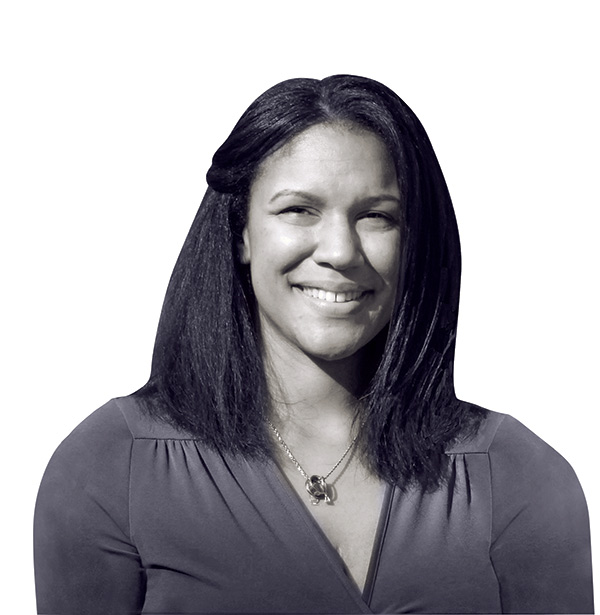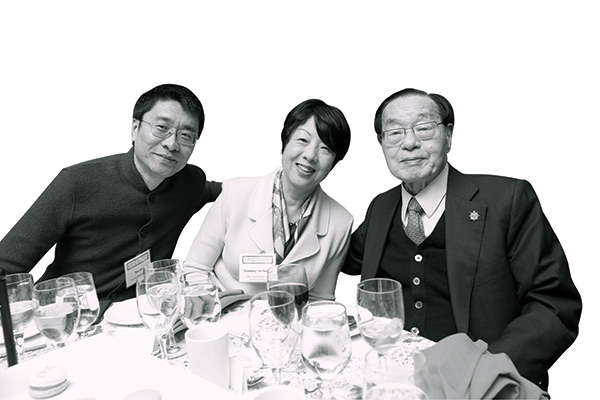
Nicole Furlonge
Nicole Brittingham Furlonge, a teacher, teacher educator and researcher, will become Director of TC’s Klingenstein Center for Independent School Leadership in September, succeeding Pearl Rock Kane. Furlonge, who will also become Professor of Practice in TC’s Education Leadership Program, is “a master teacher and scholar of education with compelling leadership qualities,” said Andy Klingenstein, President of the Esther A. & Joseph Klingenstein Fund, Inc. “My family and I could not be more pleased that she has been chosen to direct the Klingenstein Center.”
Kane, Klingenstein Director since 1980, received TC’s President’s Medal of Excellence at a special gala in April, where TC President Susan Fuhrman told her, “You have opened the doors of in-dependent schooling wider and wider … and taught that leadership is a behavior, not a title or a position.” Kane will remain on TC’s faculty.
An EPIC Launch

EPIC Launch
TC launched its new Education for Persistence and Innovation Center (EPIC) in April. EPIC, based at TC and other Columbia University schools, will study failure across a wide variety of disciplines and test theories about how to use it as a catalyst for innovation and success. EPIC is directed by Xiaodong Lin-Siegler (below, center), Professor of Cognitive Studies at TC, who has studied and written extensively about the value of failure in promoting learning and success, and includes Stuart Firestein, Columbia biological sciences professor. EPIC’s funders are the Weiming Education Group, led by Hao Lin (below, left); the Alvin I. & Peggy S. Brown Family Charitable Foundation, Inc.; the National Science Foundation; and the Carnegie Corporation of New York. TC also presented its first EPIC Achievement Award to Dr. James S.C. Chao, (below, right) Founder and Honorary Chairman of Foremost Group.
That Thing Called Digital Learning

Digital Learning
The TC Digital Learning Exhibition, showcasing “the range of how TC people have taken up digital learning,” aired in TC’s Gottesman Libraries’ Smith Learning Theater in April. “People want guidance in what this thing called digital learning could be,” says Lalitha Vasudevan, Professor of Technology & Education. She and her Media & Social Change Lab collaborated with Steven Goss, Vice Provost for Digital Learning, whose office has created many new online TC offerings.
AERA: A Big Year in TC’s Back Yard

Amy Wells
AT APRIL’S AMERICAN EDUCATIONAL Research Association annual meeting, in New York City, Amy Stuart Wells (Ph.D. ’91), Professor of Sociology & Education, began her AERA presidency. An authority on the intersection of racial inequality and educational policies, Wells will emphasize “leveraging educational research in a post-truth society.”
Susan Fuhrman, concluding her final year as TC’s President, chaired a featured session, convened by Wells, titled “Reimagining Education for the Changing Public: From Research to Promising Pedagogy in Racially Diverse Schools.”
TC honorees at AERA included:
- Yolanda Sealey-Ruiz, Associate Professor of English Education; the Revolutionary Mentor Award of AERA’s Critical Educators for Social Justice (CESJ) Special Interest Group.
- Haeny Yoon, Assistant Professor of Early Childhood Education; the Emerging Scholar Award from AERA’s Critical Perspectives on Early Childhood Education SIG.
- Cathlin Goulding (Ed.D. ’17); the Outstanding Dissertation Award from AERA’s Division B.
- Cati de Los Rios (Ph.D. ’17); Outstanding Dissertation Awards, Hispanic Research Issues SIG and CESJ SIG.
- Judith Scott-Clayton, Associate Professor of Economics & Education, and Corbin Campbell, Assistant Professor of Higher Education, Outstanding Reviewers, AERA Journal Publications Committee.
CAPTION: GRAND TOTAL TC faculty, students, staff and alumni delivered 376 presentations at the annual meeting of the American Educational Research Association
TC Unleashed

“Unleashing”
“Unleashing,” a 21-piece art installation honoring the spirit of the late TC philosopher Maxine Greene and her commitment to education, social justice and equality, occupied the nooks and crannies of TC’s campus in April and May. The “site-specific, multi-media” exhibition included works by Rafael Lozano-Hemmer, Bernd Oppl, Marion Wilson and Cathy Lebowitz. “Taking our cue from Maxine Greene, ‘Unleashing’ features artists that imagine new prospects and redefines that which is humanly possible,” said Richard Jochum, the project director and Associate Professor of Art & Art Education.
Loud Reports: Headline-Makers from TC
Whither HR; the ABCs of indigenous language politics; youth online creativity and civic engagement

Loud Reports
- Competition for talent is fierce. So why are business journals pondering the demise of Human Resources? Because as its back-office functions become automated, HR must re-emerge as a strategic partner that tackles business objectives and fields competitive challenges. Writing for The Conference Board, Lyle Yorks, Professor of Adult Learning & Leadership, TC doctoral students April Bang and Sherlin Nair, and co-authors detail how HR can deliver value by anticipating talent needs and through organizational redesign.
- Kichwa is the Americas’ most spoken indigenous language, taught in bilingual schools and used on government radio. But the multiple Kichwa (or Quechua) alphabets, reflecting various state planning efforts, are problematic, writes Nicholas Limerick, TC Assistant Professor of Anthropology & Education, in February’s Comparative Education Review. Simple letter substitutions can diminish understanding, eliminate words and evoke illiteracy’s stigma. “Speakers of minoritized languages must be involved in policy decisions for those languages,” Limerick writes.
- America talked politics after the U.S. 2016 presidential election. Many youth did so via online creativity platforms (Scratch, Archive of Our Own, hitRECord), report TC’s Ioana Literat, Assistant Professor of Communication, Media & Learning Technologies Design, and Hebrew University’s Neta Kligler-Vilenchik in February’s Journal of Communication. Post-election fan fiction, games and animations, and collaborative remixes suggest that youth are using creativity “to express themselves politically and to engage in political dialogue with their peers.” Understanding their efforts is important because youth is when “political socialization” occurs.
In Brief
- Best Fit, an interactive app created by 2018 master’s degree graduates Asha Owens, Rebecca Kwee and Danielle Llaneza for 9th-12th graders to query first-generation students about college, won TC’s first student EdTech Innovation competitionin December.
- The African Diaspora, an Advanced Placement Capstone Course devoted to the forced dispersal of African people world- wide, piloted this year in Medgar Evers Preparatory High School in Brooklyn and Virgil Grissom High in Huntsville, Alabama. It was developed in significant part at Teachers College’s Institute for Urban and Minority Education.
- “Bodily states aren’t just a product of cognition, they cause it as well,” said Edward “Ted” Warburton, TC’s 2018 Julius & Rosa Sachs Lecturer. Warburton, a former dancer who directs the Arts Research Institute at the University of California, Santa Cruz, said “we must teach dance skills as if they are life skills.”
- “Re-Mapping Global Education: South-North Dialogue,” the 2018 Comparative & International Education Society (CIES) conference, was held in Mexico City in March. Chaired by Regina Cortina, Professor of Education, who assumed CIES’ presidency, the meeting drew 3,200 academics, students and education enthusiasts from 117 countries. Among the many highlights: Oren Pizmony-Levy, Assistant Professor of International & Comparative Education, will chair a new Special Interest Group for LGBT and sexual orientation and gender identity education.